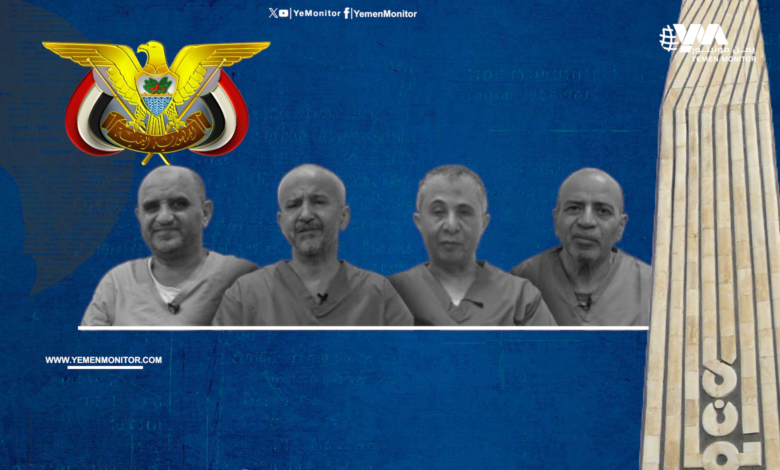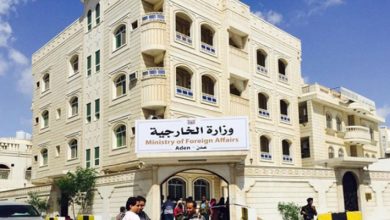
Yemen Monitor/Reporting Unit/Special:
Confessions published by the Houthis regarding an alleged “spy cell” working for US intelligence to sabotage education in Yemen reveal a new approach by the armed group that controls the most densely populated areas of the country to tighten its grip on state institutions.
The Houthis presented a highly incoherent and embarrassing narrative of what they claimed were US intelligence operations in the country’s curricula and the management of public and higher education over the past half-century. The confessions showed that the accused academics who appeared in the videos were arrested and tried for doing their jobs in managing the educational process over the past four decades.
Why did the Houthis present these illogical confessions that came out in a poor scenario despite the massive media promotion in the group’s controlled areas? This report attempts to answer this question.
Radical Changes
The Houthis announced last year the start of a phase of “radical changes,” closely linked to the education sector and the group’s armed activities, which will include alterations to public policies and administrative regulations. The office of the Houthi leader is crafting new public policies that will be imposed on all institutions, focusing on three main areas: the faith-based identity, a unified vision, and shared commonalities. The group has traditionally promoted its version of Islam (Zaidism) as the ‘religious identity,’ and the unified vision as the group’s perspective on loyalty and disavowal. The shared commonalities are defined by what is known as ‘the covenant of Imam Ali to Malik al-Ashtar,’ which is a formula for governance and authority (Imam, community, and state officials).
The Houthis have already announced a legal office that is not affiliated with their internationally unrecognized government, and their laws and regulations do not pass through the parliament, as stated by a source well-acquainted with the details to “Yemen Monitor.”
The source adds that “offices and departments within the Ministry of Education will be merged, alongside the replacement of most department and office directors, leading to the emergence of new structures.”
Any resistance shown by current employees will be deemed rebellion subject to punishment, and will be linked to espionage cells and attempts at foreign control, according to messages derived from the confessions of former officials in the education sector, as per the source.
As for what the new institutions will look like, following the ceasefire in Yemen in April 2022, the Houthis sent several delegations to Iran, including one led by “Abdullah Hashim al-Sayani,” which lasted nearly a year to study the structure of state institutions and what they call the “successful Iranian experience” over four decades since the Shah’s rule, aiming to build a revolutionary system as it stands today, according to two sources familiar with the agenda told “Yemen Monitor.” In March 2024, a leader of the group revealed their intention to replicate the position of the Supreme Leader in Yemen to be the Houthi leader.
The Challenge of Controlling Education
Unlike most state institutions and other sectors, including the military and security apparatus, the Houthis have faced significant challenges in controlling the education sector. Most of the armed group’s leaders have not received a university education or have had little exposure to it. The group’s leader, Abdul Malik al-Houthi, received a home-based education from his father, the previous movement leader, and his brother, the current leader. Between 2017 and 2024, education was entrusted to the leader’s brother, Yahya al-Houthi, who, despite being outside the country during the six wars (2004-2010), did not receive an academic or university education or attend regular classes.
Between 2015 and the present, the Houthis relied on technocrats from previous governments who were loyal to former Yemeni President Ali Abdullah Saleh, or those who remained in their positions to manage institutions regardless of who was in power. This included “education,” where the Houthis attempted to impose their agenda on curricula, schools, and education offices in districts under their control. However, this was often met with resistance from former officials and education experts in the country, who were joined by teachers, school principals, and office managers, even those who had changed their allegiance to the group.
The Houthis failed to manage education as they failed to manage all state institutions. Over the past ten years, their authority has been limited to collecting taxes and increasing prices, while they have not paid government employees’ salaries for years. Millions of children have dropped out of school, and teachers have moved to private schools, which have seen a significant increase in enrollment in recent years.
To address the severe shortage of teachers in public schools, the Houthis have either replaced official teachers or found substitutes from high school students and graduates of the armed group’s religious institutes. Unlike official teachers, these substitutes affiliated with the group receive “salaries,” which they call regular monthly incentives. However, even after a decade, the Houthis have not been able to fully control education, nor have they been able to impose their vision on curricula or other education offices and sectors.
Curriculum Changes
The Houthis have managed to make changes to the school curriculum, either by adding new lessons that glorify the group’s policies, approach, and sect, or by eliminating others, including those that promote national allegiance to the republican system and condemn the Imamate theocratic system that Yemenis revolted against in September 1962.
According to a source in the Ministry of Education, “The group wants to change the entire education system, not just a few lessons. They want to completely overhaul the curriculum, as happened after Yemeni unification in 1990.”
The source, speaking to Yemen Monitor, added, “Houthi leaders and Iranian experts do not have the expertise to modify curricula in a region like Yemen.”
“Most Yemeni education experts have always refused to work on changing the curriculum and education system. The appearance of Professor Muhammad al-Mukhlafi in the confessions was a shocking message to all other experts who are still in areas controlled by the group about the consequences of refusing to work for the group,” the source added.
Over the past year, the Houthis have arrested a number of officials in the education and curriculum development sector who refused to work for the changes the group wants. Some died under torture, while others appeared in new confession videos, including Professor Muhammad Hatem al-Mukhlafi, a lecturer at Sana’a University and dean of four educational colleges in the country from the 1980s to 2021, who was kidnapped by the Houthis on October 12. Al-Mukhlafi is considered one of Yemen’s leading education cadres, both in general education, higher education, and graduate studies, having chaired dozens of committees for education development and curriculum change since 1990. Ahmed al-Nono, the Undersecretary of the Ministry of Education for the Curriculum Sector, was also arrested.
The sources in this report spoke on condition of anonymity for fear of Houthi reprisals.
The Failure of the Republican System!
Following the treatment of education officials, it is clear that the Houthis will not stop at targeting former education officials. They will likely extend their reach to arrest former politicians, officials, and even businessmen in all sectors who held positions of responsibility during the republican era.
The Houthis aim to reinforce their propaganda that Yemen, before their takeover of Sana’a in 2014, was a stage for foreign intelligence and international influence. They want to attribute their failure to manage state institutions over the past decade, which has led to growing public discontent in their controlled areas, to intentional foreign interference rather than to widespread corruption, governance failures, economic mismanagement, and internal group conflicts.
Moreover, this is an attempt to promote the policy of isolating Yemen from the outside world and focusing on internal affairs, similar to the situation during the Imamate rule. This is an effort to justify the old theocratic regime’s approach to foreign and domestic policy.
The Houthis’ Approach
The Houthis appear to be effectively capitalizing on the Iranian regime’s experience in domestic policies, which they have always admired for its ability to sustain a “revolutionary” approach for over four decades without collapsing. This approach has become a means for the group to attribute both external and internal challenges to known conspiracies, allowing them to evade pressure from both sides and simultaneously bolster their legitimacy.
The emergence of confessions from academics and former education officials is consistent with the group’s nature and its plans to reshape society, impose “isolation,” and exaggerate the external threat, leveraging Red Sea attacks as a political tool to stifle criticism and opposition. By using confessions – which were previously rumors among the people – in a way that the public can believe, they are paving the way for comprehensive changes to Yemen’s political and social system.
However, the Houthis’ inability to mobilize public sentiment against the external threat to strengthen their internal stability will force them to suppress potential popular backlash. This is a risk that could exacerbate divisions within the group and its ” Zaydi-Hashimi,” “tribal,” and “commercial” alliances, leading to significant damage not only to their de facto authority but also within the group itself.




